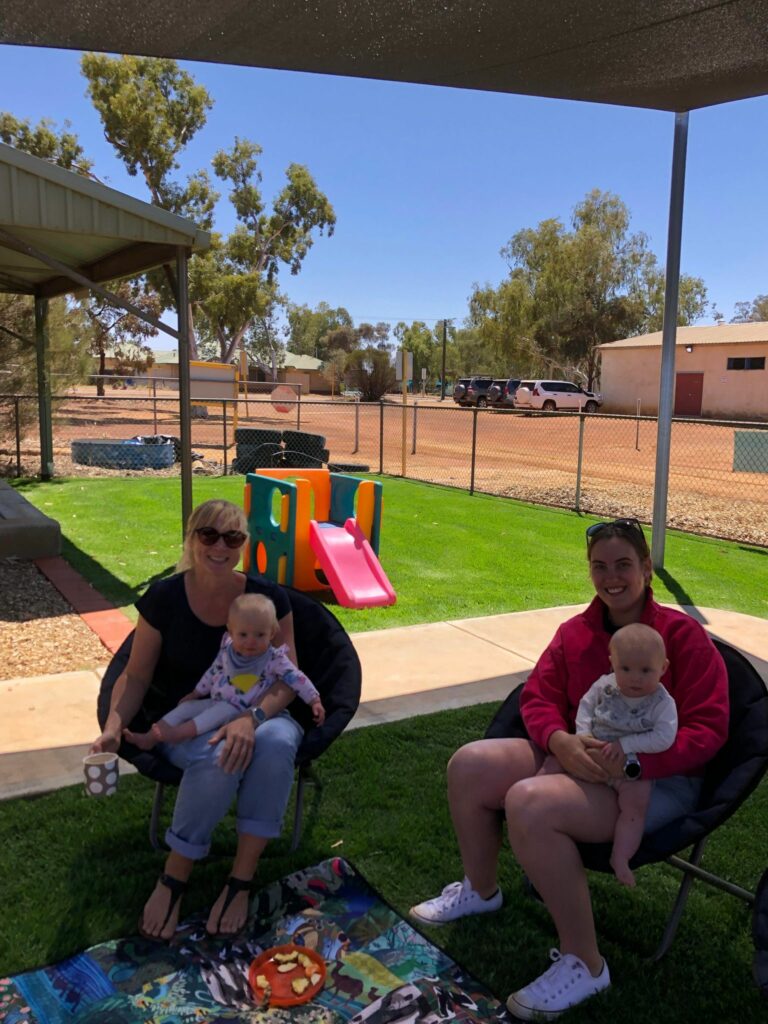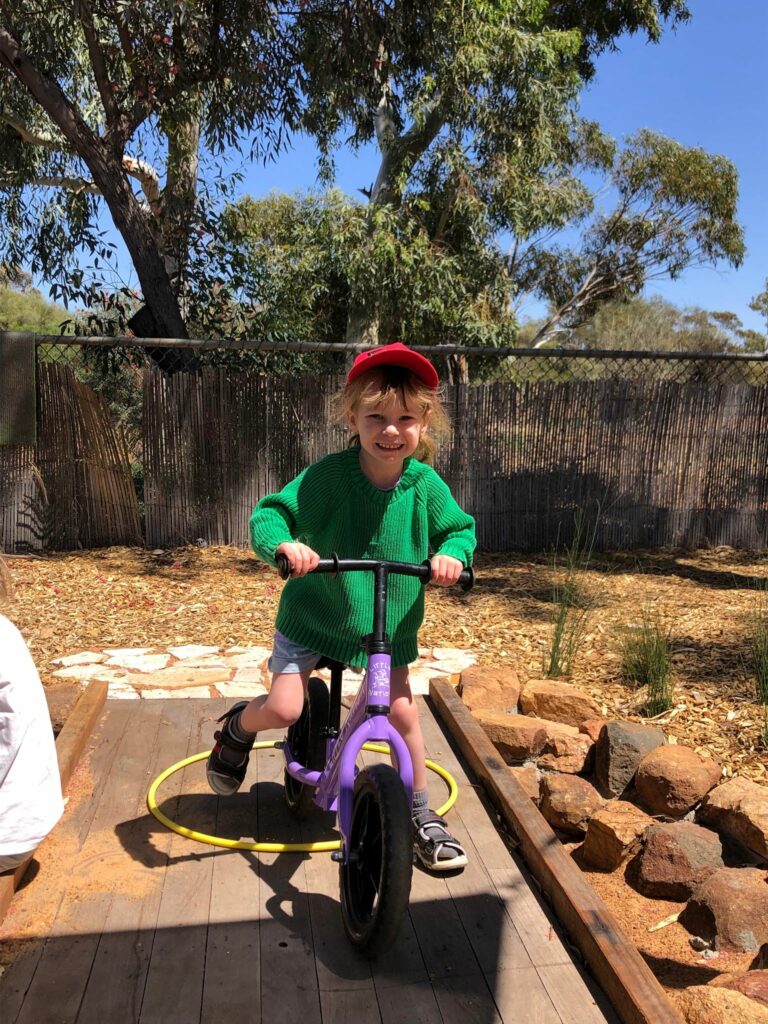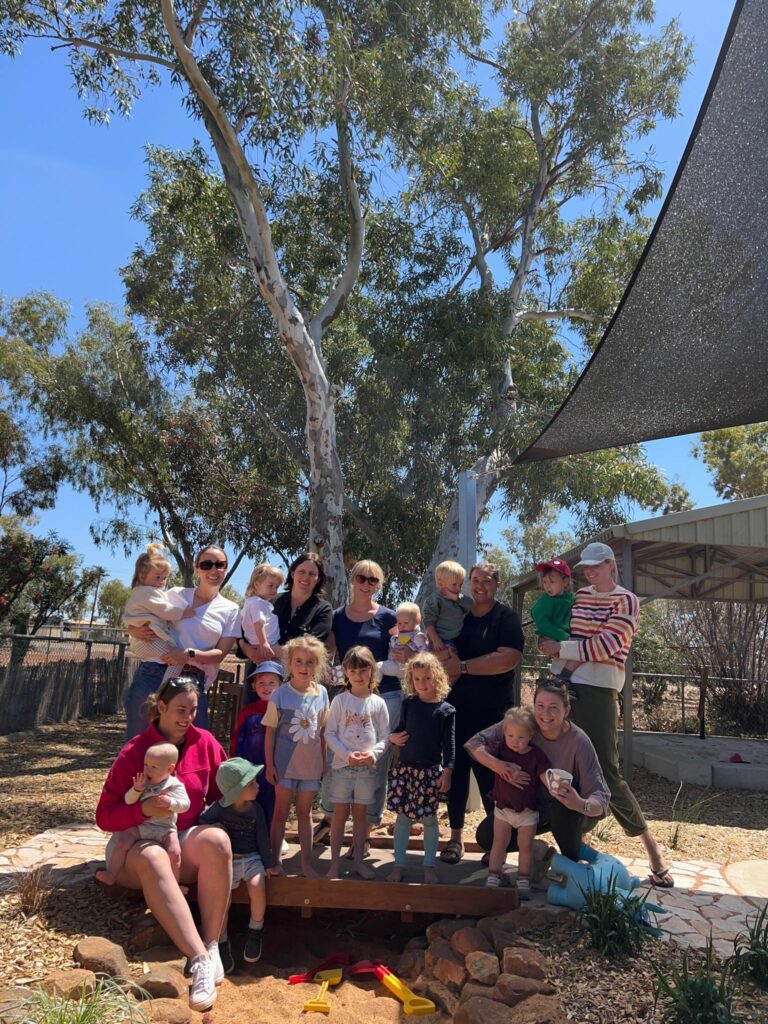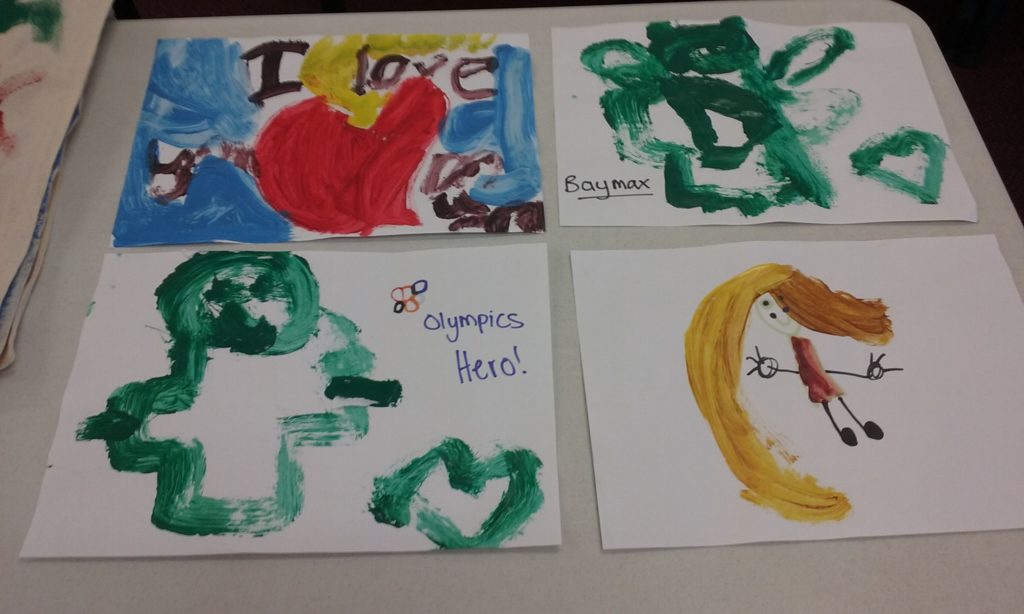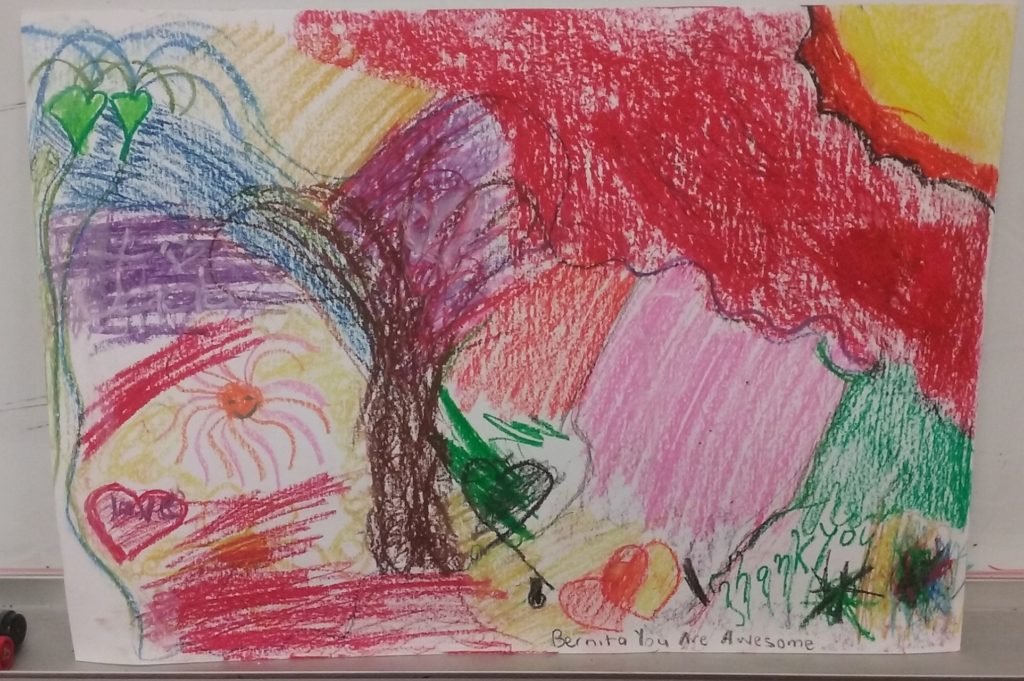Foundation for Rural & Regional Renewal (FRRR)
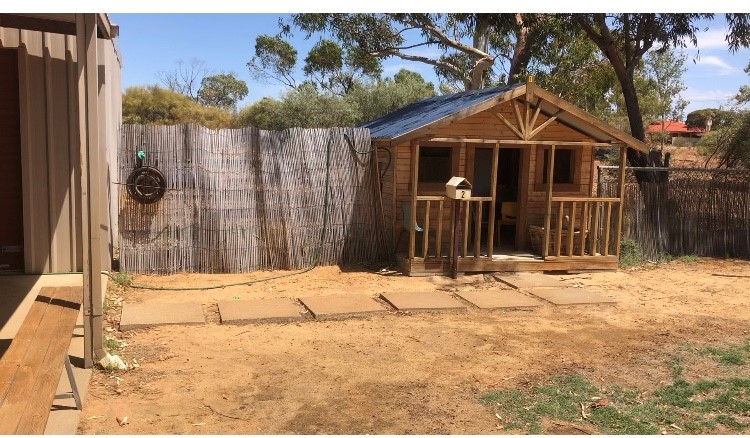 BEFORE
BEFORE
Morawa, a small town in Western Australia’s wheatbelt, lacks recreational and social opportunities for families with young children. With no cafes, the Morawa Playgroup, run for the last 40+ years, by mums (and the odd dad) serves as the primary gathering space for parents and caregivers seeking connection and support. However, Morawa Playgroup’s outdoor area was uninspiring, with a dying lawn and hard claypan soil.
Recognising the need for a vibrant outdoor space, the mums of Morawa Playgroup embarked on a project to transform their drab outdoor area into a nature playground. Collaborating with a local landscape designer, they developed a comprehensive plan to:
- Remove the old, inefficient irrigation system and replace it with a waterwise garden;
- Create a nature play space featuring sensory boxes, timber bridges, and a creek bed;
- Install shade sails to provide relief from the scorching sun and enhance the usability of the outdoor area;
- Establish seating areas for parents to connect and support each other while their children play.
The project unfolded over three years and received a boost from an FRRR grant of $9737, funded by Raine & Horne Foundation.
The completion of the project in September 2023 marked a significant milestone for Morawa Playgroup and the broader community. It’s now the only nature play space in the Shire, which spans 190km2, offering children and parents a welcoming and engaging environment. The shaded, waterwise garden has transformed the outdoor area, allowing children to play outdoors year-round and fostering a sense of connection among families.
Beyond the immediate benefits to the playgroup, the project’s impact extended to Morawa District High School, where reduced water bills freed up funds for educational resources. The positive effects of green spaces on mental wellbeing were evident at the opening of the new play space, signalling a brighter future for the community.
Despite the challenges of being a small, low socio-economic town, the project demonstrates the power of grassroots initiatives to improve quality of life. Morawa Playgroup’s success serves as a testament to the community’s resilience and determination to create a better future for its children and families.
Wagait Beach is located on the Cox Peninsula just west of Darwin and is accessible by ferry (15 mins) or road (90 mins). Young people make up around 14% of the 461 residents and beyond seasonal sports, there are very few organised activities on offer locally. Parents and young people alike had been keen to increase access to drug and alcohol free activities which would build skills and support emotional, social and physical wellbeing and in 2021, Wagait Shire Council supported to the creation of the Wagait Youth Group.
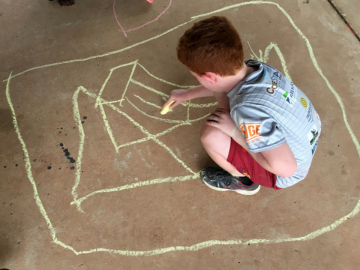
The Council received a Strengthening Rural Communities grant of $6,000 to assist with establishing their youth program that focused on building more opportunities in the community for young people including the co-design of a local Skate Park. Across four skate workshops, the children designed, built, and decorated portable ramps that went into immediate use, while plans are now well underway for the permanent skate park. Beach cricket, movie nights and discos for the school aged children have since followed.
In addition to a more physically active lifestyle, the young people felt listened to and have become more engaged and active in civic affairs. A collaboration developed between Health Lifestyle Seniors participants and the young people which saw the seniors sharing their skills such as cooking and sewing, which in turn built intergenerational bonds of appreciation and understanding.
Furthermore, the Council employed a Year 12 student for 12 months in the role of Youth Development Officer. This role takes the lead on designing, delivering, and reporting on the ongoing youth program. The Council hopes to continue offering this position annually and expand it into an internship, covering other aspects of council work and community service to develop youth leadership skills locally.
Mission Australia has worked in partnership with Mid Coast 4 Kids to deliver ‘The Common Approach’ training to build capability for a whole of community response to child youth wellbeing in the Mid Coast region.
The Mid Coast was dramatically impacted by the South Eastern Australia floods in 2022. The townships of Taree, Wingham and Gloucester were inundated or compromised with flood waters and structural damage cutting communities off for long periods. There was flood damage to farm lands, residential housing areas and outlying communities. This disaster compounded significant stress that has been experienced in the communities for an extended period due to the impact of prolonged drought, COVID-19 and bushfires.
As a result, early childhood centres and schools reported increased anxiety and trauma-related behaviours in children and young people, and the service system was not coping, with allied health and other support services reporting wait times of more than 12 months.
‘The Common Approach’ has equipped a range of members of the Mid Coast community with the skills to have quality conversations and build resilience to respond to the wellbeing needs of children, young people and their families, now and into the future. In total, 228 people including community service, health and education professionals, community volunteers and parents were trained to have evidence based, holistic conversations with children and young people about all aspects of their wellbeing.
Participants report increased confidence in being able to support children and young people to identify strategies to improve individual wellbeing. “Through this intervention we have equipped our community to share responsibility for promoting and supporting the health and wellbeing of children and young people in our community, via evidence informed practice,” says Program Manager Bree Katsamangos.
“Additionally, practitioners will benefit from the opportunity to engage in a bi-monthly Community of Practice to support ongoing development and practice.”
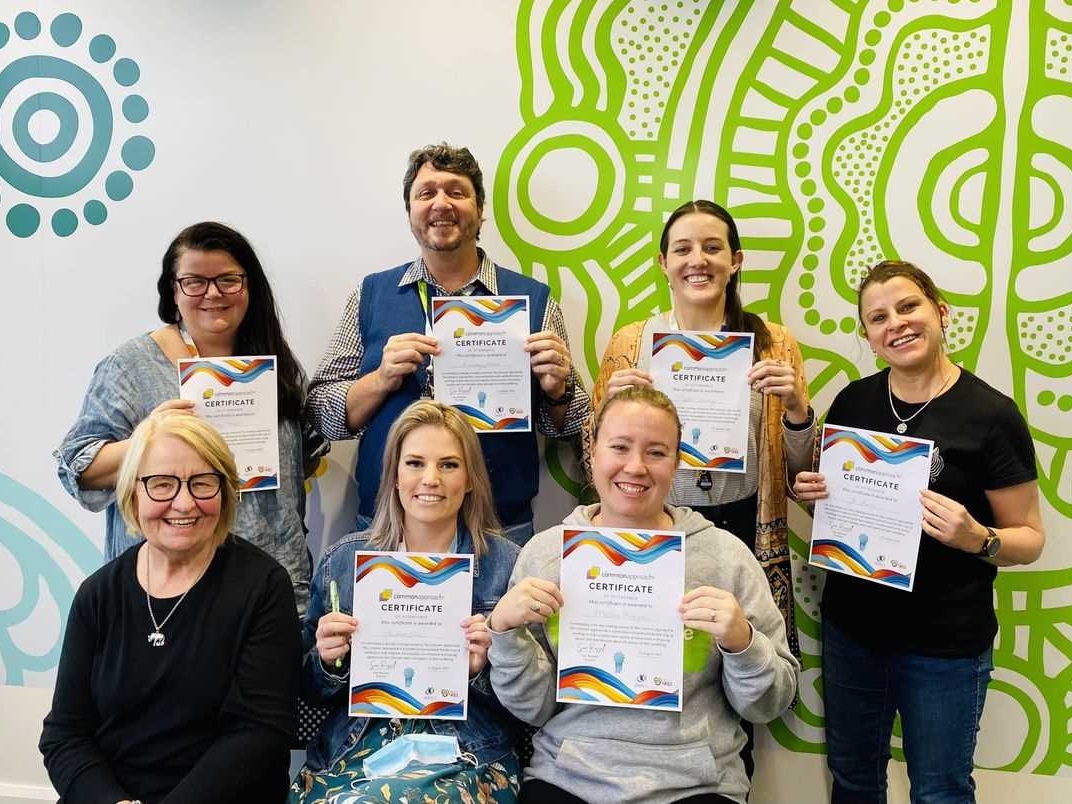
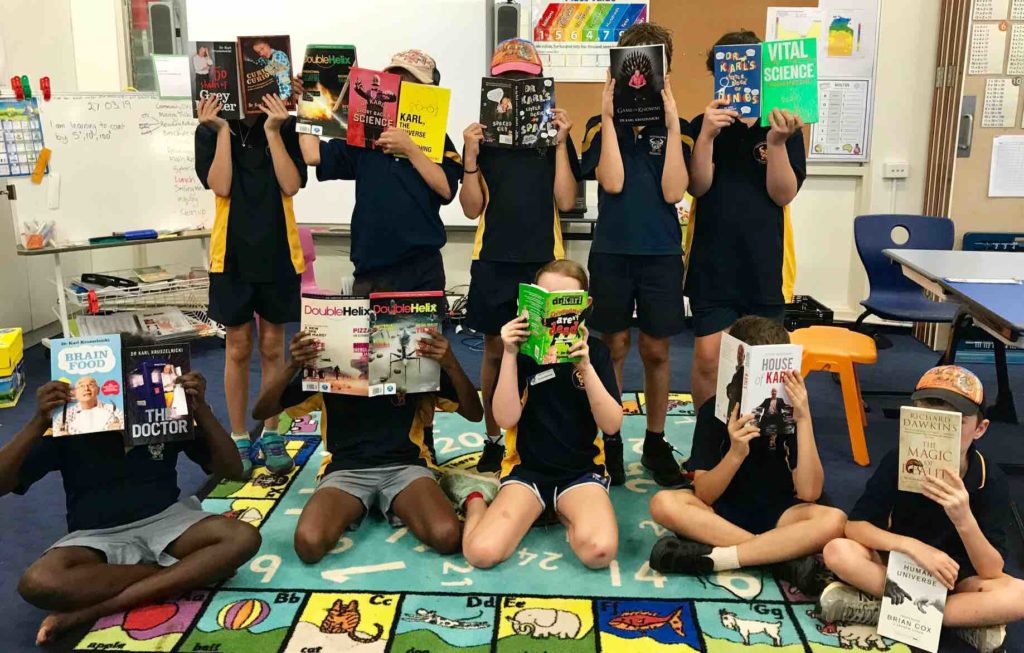
Did you know that some schools in remote Australian communities might have as few as 15 books in their library?
That discovery in 2017 prompted Corey Tutt to start sourcing and supplying resources himself, initially from his personal library. DeadlyScience Limited was established in 2020, and is now a registered charity. Through DeadlyScience, Corey is seeking to inspire a new generation of scientists.
It focuses on providing Science, Technology, Engineering, and Mathematics (STEM) and early learning reading resources to remote Australian schools to help increase engagement.
The initial priority is schools with a high proportion of Indigenous children. Where possible, and appropriate, DeadlyScience sources materials from Indigenous authors, artists, and translated versions in Indigenous languages. In the three and a bit years since inception, DeadlyScience has had more than 110 schools requesting resources.
They have delivered more than 16,000 books, 500 telescopes (and basic science kits), 80 educational resources and six greenhouses (plus seeds, and educational materials to support food production projects) to more than 100 Australian schools and/or communities.
This growth looks set to continue as the organisation gains more momentum and profile. Another key activity involves maintaining a website to support teachers in remote schools with access to high quality scientific research and relevant experts in their fields (also of Indigenous background, where possible).
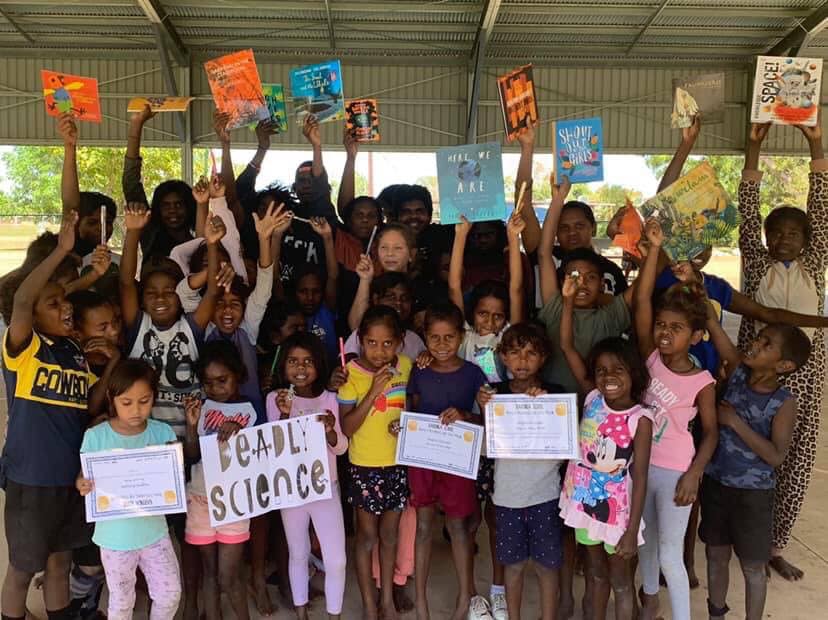
In 2020, DeadlyScience partnered with FRRR to set up a Not-for-Profit Fundraising Account, allowing them to attract tax deductible contributions from a broad range of donors to expand their activities and support the overall capacity and operations.
You can add your support by donate securely online, or check out the DeadlyScience website to learn more about their work.
To learn more about opening a Not-For-Profit fundraising account, get in touch with Jo Kemp.
For the residents of Coragulac and its surrounding communities, having access to excellent early childhood education with the right facilities is a top priority for local families.
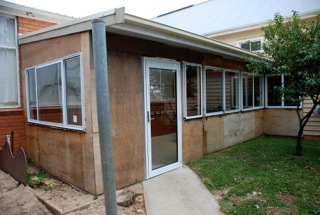
The Coragulac & District Kindergarten has provided care and education for their small community for many years. The facility’s three staff and local volunteers run a three-year-old program for 21 children, and a four-year-old program for 20 children.
Play-based learning helps to develop coordination, motor skills and problem solving skills, while focusing on social skills that are invaluable to kids, such as how to get along with their classmates, how to communicate and follow general rules. It also allows kids to follow their imagination and explore their interests.
The energy and imagination the kids bring to the kindergarten is endless, however their ability to play outside was often met by challenges due to weather, and between the scorching summer heat and chilly winter days, the kids weren’t able to enjoy being outside for very long.
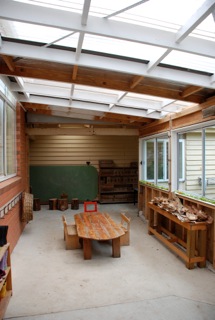
This made some play-based activities very difficult, as the kindergarten lacked a suitable area for things like pot planting and chalk drawing. To continue providing great childcare for local families, the kindergarten needed to upgrade their facilities.
The Kindergarten was awarded $5,000 through the Gardiner Dairy Foundation Community Grants program for their Sheltering Our Children for a Bright and Happy Future project, which built a new verandah for outdoor learning and activities.
The new space allows the kids to enjoy being outside without worrying about the weather, and provides an area for ‘messy’ play-based learning. In addition to the kids who attend the kindergarten during the week, the space is also used after school and on the weekends by families with school-aged children and children with disabilities, as it provides a sheltered, fenced and safe play space.
Child Writes Fund is a charity that ’empowers children to navigate their future through story’. The Child Writes program gives primary school-aged children a voice by offering them the opportunity to write and illustrate their own children’s picture books.
The Fund partnered with FRRR in March 2019 to create a Not-for-Profit Fundraising Account to support its endeavours, and the funds raised contributing to delivering more programs in rural and regional areas where children are in crisis and making the library of books widely available via an app.
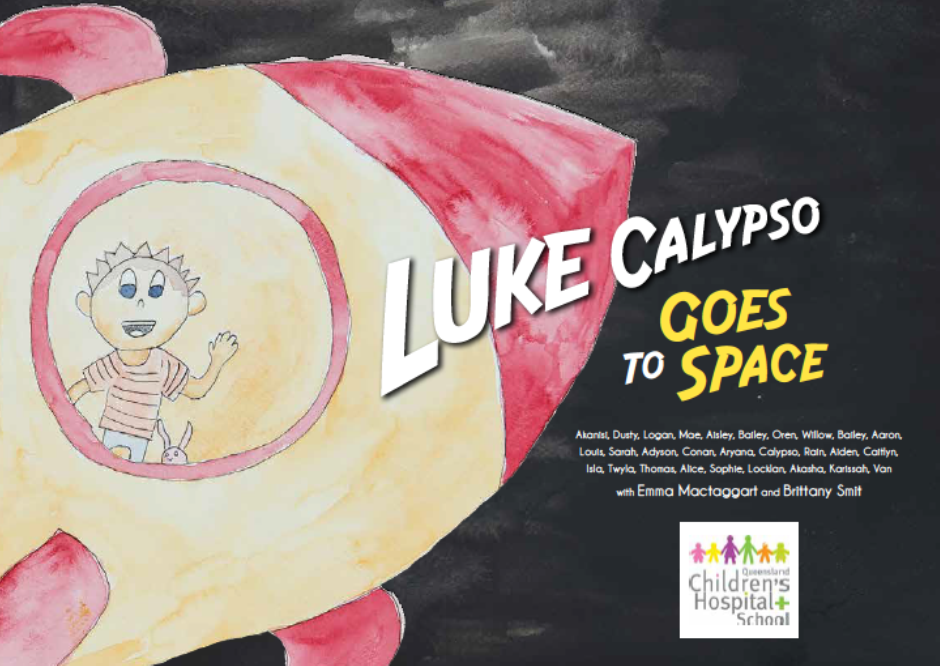
A group of approximately 15 children develop the picture books through a five-day workshop during which they collaborate on a single picture book (from initial idea through writing, illustration, publishing, launch and distribution) and address a specific issue relevant to their day-to-day life. The books present a range of messages, including addressing issues across health, environment, relationships, bullying, racism and exclusion. Through storytelling, the children are empowered to navigate these issues and create a product that can be shared by others. The books are distributed for use to locations where children are in crisis, such as local hospitals, doctor’s surgeries, The Pyjama Foundation and Ronald McDonald House. Copies of the published book are also provided to the group to sell and generate a profit.
Copies are donated to places (such as hospitals) where children are in crisis, allowing the child authors and their readers to be encouraged by the achievement and generosity of their peers.
Every book is also made available for purchase online in electronic form, which means that groups can receive royalties from the sales of their books.
Child Writes Fund also supports International Read to Me Day, held annually on March 19th, reminding children to be part of the conversation and remind their family they would like to be read to often. It is a social awareness campaign, reiterating the importance of reading to children, and children sharing this skill with their peers.
Child Writes Fund has worked with communities in crisis, like Eidsvold in Queensland’s North Burnett Region, which, when they took the program there, had the unenviable tag of being the location for one of the highest suicide rates amongst its young adult males in the country. They’ve also worked with the Queensland Children’s Hospital School, working with children who were patients, or a parent or their sibling may have been a patient.
Founder of the Fund, Emma Mactaggart, explained the significance of the hospital school project.
“It is a small school determined to give the children as much encouragement as possible, but the children inevitably feel as though they are ‘alien’ as they are not at their normal school. It was the week of the 50th anniversary of man landing on the moon, so it didn’t take too much of a leap for the children to connect their sense of isolation to that of deep space; hence Luke goes to space, to discover things are not as amazing as he would have liked. He does dig deep though, and simply because he is determined, he manages to come back to his home.”
Learn more about FRRR’s Not-for-Profit Fundraising Accounts, or for more information on the Child Writes Fund, or to make a tax-deductible donation, visit their website.
Content warning: this article deals with sensitive themes including domestic violence that might be disturbing for some audiences.
The effects of domestic violence on children are well documented, yet often there are no systems in place to support these kids who witness the physical and /or sexual and emotional abuse, threats, and aftermath of such incidents.
These kids are often fearful and anxious, always on guard waiting for the next event to occur. They never know what will trigger the abuse, and therefore, they never feel safe. And children who grow up with abuse are expected to keep the family secret, sometimes not even talking to each other about the abuse.
FRRR’s Innovation for Community Impact (I4CI) program supports innovative responses to domestic and family violence, mental health, education disengagement, criminal behaviour, and unemployment in NSW. It is a unique partnership between philanthropy, local communities and government to tackle some of NSW’s most pressing social issues.
Speak Out 4 Kids project, coordinated by the Kempsey Family Support Services in the Nambucca Local Government Area, received a $45,000 I4CI grant to help deliver an eight-week program called Kidz Group for children aged between 8-12 years who have experienced living with or being exposed to domestic violence and are no longer in that environment.
Whether or not children are physically abused, they often suffer emotional and psychological trauma from living in domestic violence situations. Because they’ve grown up in an environment in which one person uses intimidation and violence over the other person to get their way, children learn that violence is an effective way to resolve conflicts and problems.
With this understanding, it’s easy to see how the cycle is perpetuated.
Over the course of 12 months, 20 children and their caregivers attended the Kidz Group program and engaged with specialist staff to address the impacts of domestic violence.
Four programs, each 8 weeks long, delivered intensive therapeutic support, helping the children to learn protective behaviours and safety strategies, and build their self-esteem, confidence and resilience. They were also encouraged to explore and share their feelings and thoughts on the impacts of domestic violence, and most importantly, have fun and meet new friends in a safe environment.
The families of these children were offered support and referrals to external agencies as identified, and provided with ongoing support while their children were engaged in the groups.
At the end of the program, the feedback from participants was overwhelming. One 10 year old boy said, “Coming to this group has made me realise I can be myself, and not act the way my dad did towards my mum.” Another 9 year old boy said, “If I didn’t come to this group, I wouldn’t be able to talk about my feelings.”
Unanimously, one of the biggest learnings for the kids was that it’s ok to say how they feel.
This grassroots program is a great example of a support service that was needed specifically in this area. For the 20 families participating in the program, it has made a real impact on their day-to-day lives and created a more positive outlook for the future. The behavioural changes that resulted from the program were also noted by caregivers, with one grandmother commenting, “X has really enjoyed going and I have seen a huge improvement in his attitude towards me, school and his siblings.” Another mum said, “I feel my child has realised his behaviour towards me is not ok.”
The partnerships with existing services across the Nambucca LGA were strengthened with the Speak Out 4 Kidz team, with particular focus on the Nambucca / Bellingen Family Support Services and the local education units and the Nambucca Valley Domestic Violence Monitoring Committee.
This project has resulted in enhancement of the capacity for local services to deliver support to women and children impacted by domestic violence, thanks to improved information flows, referrals and new partnerships and training for local staff, which will enable the project to continue after this funding cycle.

